The “Outstanding Mentor Award” of Tsinghua University is an event initiated by the Graduate University in 1998, in which graduate students are invited to vote for excellent teacher representatives in their mind, who “prioritize moral cultivation, foster profound scholarship, treat students as friends and focus on talent training as the basic duty”.
The evaluation for the 18th “Outstanding Mentor Award” lasted four months, including such links as preliminary nomination, official nomination, review and voting, and result check. 47 teachers from 39 departments and schools were selected as “Outstanding Mentor”.
Teacher profile
Wang Han, associate professor and doctoral supervisor of the Department of Earth System Science (DESS), Tsinghua University, is a winner of the National Science Fund for Outstanding Young Scholars. In 2018, she joined the DESS, and set up the Lab of Plant Interactions: Climate, Ecosystem & Atmosphere (PICEA), a research team of vegetation simulation and theoretical ecology, dedicated to studying the interaction (I) between plants (P) and the environment, and concerned with the competition (C), evolution (E) and adaptation (A) of plants, as well as the changes of climate (C), ecosystem (E) and atmosphere (A).

Over the 4 years of her teaching, A/Prof. Wang has supervised 5 doctoral students and 3 postdoctoral fellows. Her students have won many awards, including Tsinghua University Scholarship for Future Scholars, in addition to many awards for outstanding reports in various academic conferences. Her first doctoral student and first postdoctoral fellow have found teaching positions in prestigious universities. As a tutor of Zhili College, she has guided several undergraduates to complete their SRT projects. Her course "Innovative Research Methods for Postgraduates" offered in the DESS aims to systematically improve students' innovative research ability and scientific research taste. In 2021, she won the second prize of Tsinghua University Young Teachers' Teaching Competition.
01 Prioritizing moral cultivation
Enjoying research, seeking the truth and knowledge
In the eyes of students, A/Prof. Wang Han has always been a warm and sunny teacher, constantly influencing people around her with her vitality and love for nature. "As a teacher, the happiest thing is not to hear students say to me, Teacher, I have published a major paper, I have won a national prize, I have found a job with an annual salary of one million yuan... but to hear them say, Teacher, I have had a good time in Tsinghua over the past five years." Being able to be curious and happy from the heart in the process of scientific research and enjoy the happiness of investigation into the nature of things is the expectation that A/Prof. Wang places on the members of her research group, and it is also the goal that she has been pursuing.
Zhu Ziqi, a doctoral student, is still deeply impressed by a luncheon hosted by A/Prof. Wang: "We sat around and listened to A/Prof. Wang sharing her study experience. A/Prof. Wang said that falling in love with scientific research is also a process of falling in love with exploring nature. Nature often tells her story quietly, which requires us to calm down, observe and think. Among the fallen leaves, some are yellow early, some are still greenish, some are big and some are small. If we are not curious about the world, we will only say that autumn has come, but after careful observation and deep thinking, we will put forward our own hypothesis and then use scientific methods to verify it. "
As leaves fall in autumn, we can know the big picture from small things. A/Prof. Wang Han believes that "passion is the first step to do scientific research well, and exploration is the only way to do scientific research well." In Beijing, she sometimes takes her students to watch flowers and fruits on campus, climb trees in the botanical garden and listen to ice singing in the Yuanmingyuan Garden ... Starting from the things around us, students develop the habit of observing their environment and integrate their passion for research in daily life. Life is like poetry, presenting new meaning each time you read it. A/Prof. Wang has also led her students to Mount Gongga many times, personally picking plants and gathering data through measurement. Instead of lecturing alone, she teaches through actions. At the frigid mountain top in Gongga 4,000 kilometers high, the team was deeply moved by a tenacious young spruce (Latin generic name: Picea), which also became a source of inspiration for and a spiritual symbol of "LPICEA", the name of the laboratory, always persevering and flourishing.

LPICEA team collects plant samples in Mount Gongga.
Practical scholarship and fruitful results.
“Don't rush to publish a major article. As long as you keep absorbing nutrition and grow sturdily, it is natural to blossom and bear fruits." With regard to research work, A/Prof. Wang Han repeatedly warned the students, "Just like the little spruce, although it grows slowly, it can flourish forever braving the elements."
Ren Yanghang, a doctoral student, said, “One of my manuscripts was revised more than a dozen times before submission for publication. I almost broke down from repeated revisions. Prof. Wang kindly encouraged me and revised the article sentence by sentence with me. It was her encouragement that keeps me going and lets me learn the meaning of ‘slowing down' in the process of constant polishing."
"Graduate students in Tsinghua should not only do research well, but also dare to face challenge and take up important and difficult original research." A/Prof. Wang has been following the principle of high requirements, doing scientific research in a down-to-earth manner and writing articles diligently. It is in such a hard-working and challenging frontier that A/Prof. Wang Han leads the team to achieve a series of important original research results in the theoretical research of plant adaptation, which have been published in top academic journals such as Global Change Biology and New Phytologist, and successively won the support of the National Natural Science Foundation and the National Science Fund for Outstanding Young Scholars.
In addition, A/Prof. Wang Han also leads her team to actively practice the scientific spirit of openness and win-win cooperation, and constructed and shared the China plant functional traits database, which was downloaded nearly 10,000 times in four years, facilitating a series of related work at home and abroad.
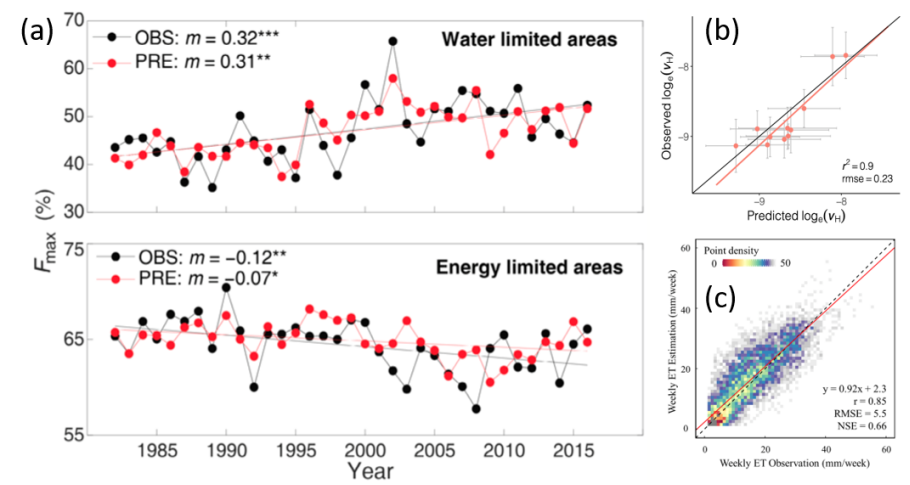
A glimpse of the research results of the LPICEA team: (a) developing a simple and reliable mechanism model to predict the change trend of vegetation greenness in the Tibetan Plateau over the past 30 years; (b) developing a theoretical model to successfully predict the key characters of plant carbon-water coupling on the elevation gradient of Mount Gongga; (c) With the aid of carbon-water coupling, the evapotranspiration of the ecosystem was successfully simulated with a simple and universal vegetation productivity model.
02 Fostering profound scholarship
Individualized teaching and research
In the LPICEA research group, each member has a plant representing himself/herself. Thriving on A/Prof. Wang Han's balcony, these various plants all bear A/Prof. Wang's expectations for each member, "Each of you is unique, so you don't need to compare with others. Just find your own niche and grow up happily!" Know yourself and realize yourself, which is also A/Prof Wang Han’s goal in student training. In the research group with students from different disciplines ranging from ecology, hydrology, geography to remote sensing, A/Prof. Wang provides a very inclusive research environment for everyone, and encourages everyone to explore freely according to their own interests and strengths.
A/Prof. Wang Han has been engaged in the research of natural vegetation, but Qiao Shengchao, a doctoral student who grew up in the countryside, wants to do more pragmatic research: reliably predict grain output to cope with the risk of climate change. Considering the particularity of agricultural vegetation, the professor and the student have cooperated to innovatively apply the natural vegetation model developed by Wang to the agricultural field, and realized the large-scale simulation of crop yield in a more concise way, equal to or even better than the international mainstream complex model. A series of scientific research results have been published in flagship academic journals in the field.
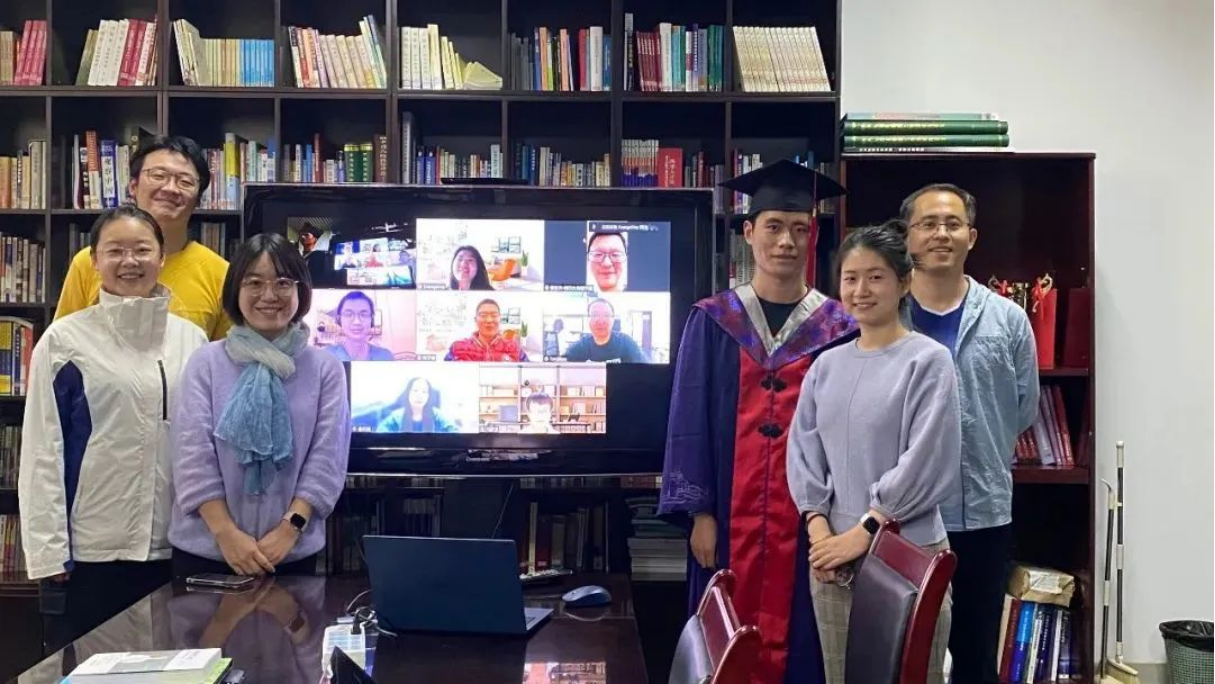
The new and old members of LPICEA took a group photo online and offline upon the graduation of Qiao Shengchao, the first doctoral student of A/Prof. Wang
In addition, A/Prof. Wang Han also works hard to build an international research platform, not only inviting foreign experts to come to China or guide students online, but also organizing various forms of Science Club within the research group. Since the beginning of this semester, academic new stars at home and abroad have been invited to deliver reports for more than ten times. Based on the Zijing Forum, famous scholars at home and abroad have been invited to report online attracting nearly tens of thousands of participants. In view of the students' weakness in English writing, A/Prof. Wang launched an English writing training program in the team. Each graduate student writes a blog related to scientific research every month, which is modified by an English speaker before being posted on the research group’s website. Up to now, more than 50 blogs have been posted.
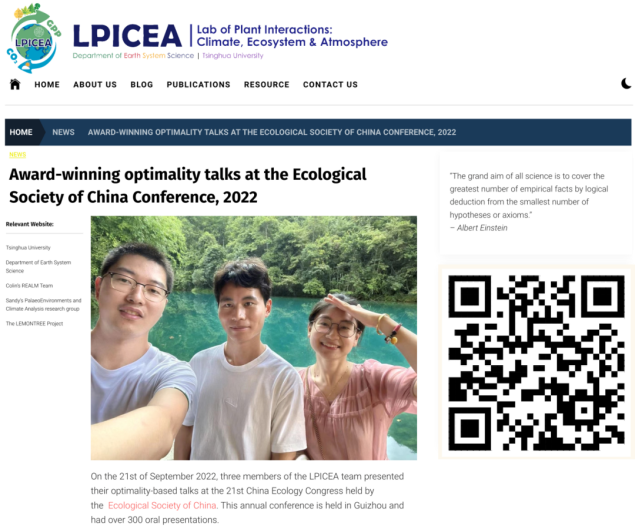
A glimpse of LPICEA blog and webpage QR code. Welcome to visit our blog
Teaching enriched by ceaseless learning
A/Prof. Wang Han is well aware that “one learns and then knows the deficiency, one teaches and then knows the difficulty", actively undertakes teaching tasks and teaching reform projects, closely follows the problem of "how to improve graduate students' innovative research ability", and cooperates with other professors in the Global Competency Center and the DESS. From the teaching reform project workshop to the elective course "Academic Writing Skills and Practice" and then to the compulsory course "Innovative Research Methods for Postgraduates", a set of teaching modes integrating teaching, interaction and practice and a complete curriculum system have been set up step by step through exploration with a large amount of teaching practice. In the curriculum, students' rational, independent and open scientific spirit and values are systematically shaped, their innovative, critical and collaborative research thinking and ability are cultivated, and systematic, diversified and cutting-edge theories and knowledge are imparted.
To improve the development of the required courses offered by the DESS, during the intervals of heavy scientific research and teaching tasks, A/Prof. Wang Han does not forget to continue to improve herself. She has participated in many activities such as "Teaching and Learning" in the Teacher Development Center, and actively learned the advanced experience of teachers in the university; participated in the teaching and research meetings of the Center for Global Competence Development (CGCD) and discuss with fellow teachers how to cultivate students' global competence in their respective classrooms. To improve the overall level of her courses and provide students with a broader vision, A/Prof. Wang has also attended the benchmark course "Enlightenment of Art" in Xinya College, and in the light of what she has learned, she inspired her students to think about the role of art in scientific innovation in her course.
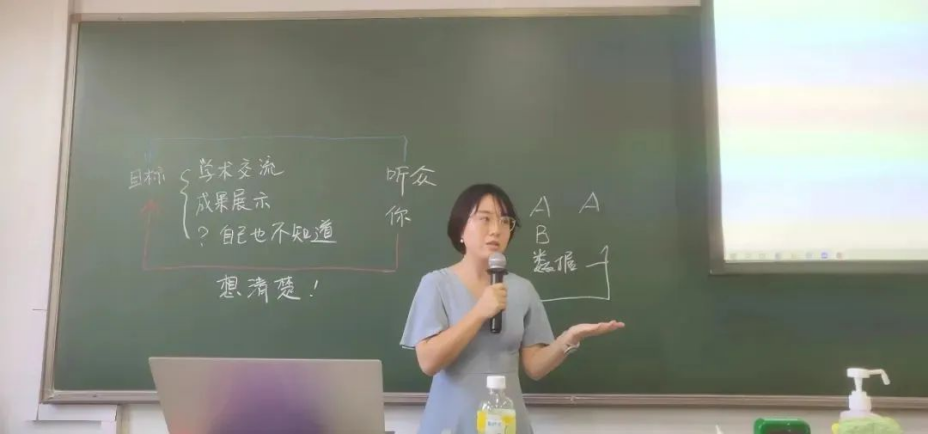
A/Prof. Wang introduced the essential points of attending academic conferences to the students in the course “Innovative Research Methods for Postgraduates”
03 A good friend of students
A teacher who is also a friend
"When I first communicated with A/Prof. Wang, I was impressed by her gentleness and goodwill," said Feng Zeyu, who also noted that during his stay at home due to the outbreak of the COVID-19 pandemic, A/Prof. Wang Han called him several times, telling him to take it easy and strive for self-improvement at home. Being a friend with students is exactly what A/Prof. Wang believes in getting along with them. In the minds of her students, A/Prof. Wang is always ready to listen to students' confusion, anxiety and perplexity on an equal footing, always going all out to offer support and help.
Xu Huiying, a doctoral student who is on an exchange visit abroad, said, “I’m now visiting a foreign country. Although I can't meet and communicate with her often, Prof. Wang always takes time to care about me, guide and help with my studies, and give me encouragement and support in my life. When I’m depressed, Prof. Wang will share with me similar things she encountered when studying in Australia, which makes me feel that whether it is a temporary setback in scientific research or a bad thing in life, we can always observe it from another angle, find the positive side, adjust our mentality and face the problem, and it will be fine after the rain. "
Under the leadership of A/Prof. Wang Han, the research group has also developed a team culture of being dedicated to research, cultivating team spirit and staying healthy through exercise. A/Prof. Wang believes that only with physical and mental health can we do scientific research more efficiently and fully enjoy life. She not only keep doing exercise by herself, but also often leads us to take part in exercise activities of various kinds, from fitness to mountain climbing, from the Master Cup badminton match to the Color Run.
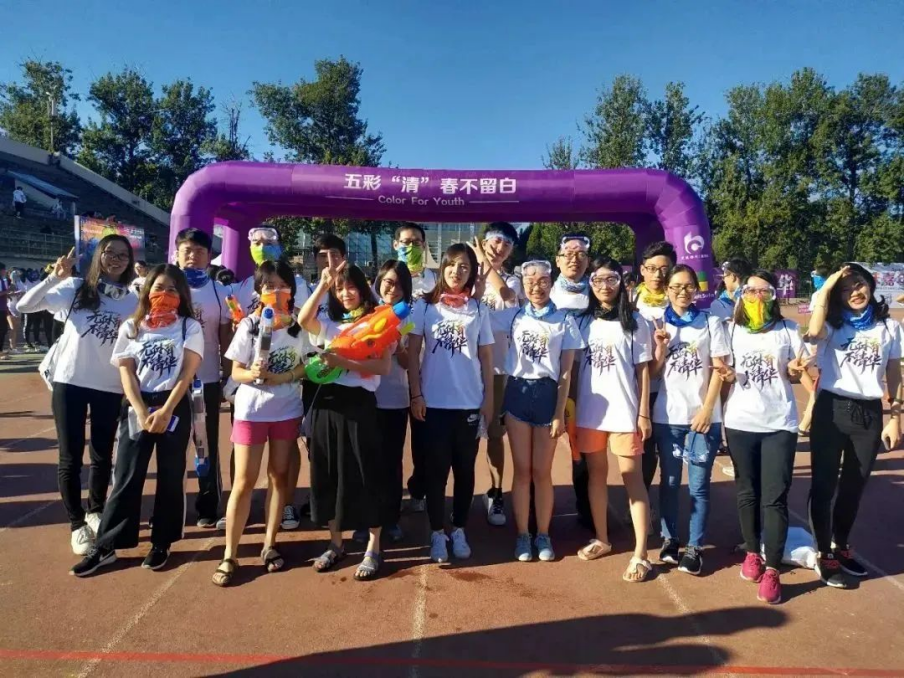
Flourishing Youth in the Sunshine: A/Prof. Wang and her classmates take part in the Color Run.
Influenced by A/Prof. Wang's earnest life attitude, the team members also independently designed the logo of the research group, which vividly demonstrated the role of vegetation in the global climate-carbon cycle feedback. Students also actively designed a variety of customized peripheral products: business cards, stickers, postcards, canvas bags ... Even the universal vegetation productivity model proposed by A/Prof. Wang is printed on the edge of hoodie sleeves, turning the strict and cold formula into beautiful and flexible patterns. On holidays, students would gather at A/Prof. Wang's home to make jiaozi, taste cocktails made by A/Prof. Wang, listen to Jazz and make dried flower curtains ... The colorful team activities make everyone feel at home in the research group.
Offer inspiration for lifelong growth
When Zhang Han, a doctoral student, first joined the group, she was almost overwhelmed by the challenges posed by a brand-new field, unclear about how she should make efforts. A/Prof. Wang gave her a book, Letters to a Young Scientist written by scientist Edward Wilson, and constantly encouraged her to believe in herself and explore bravely. Jin Lewei, a doctoral student about to enter Tsinghua University, said, "Prof. Wang recommended Lab Girl to me, a book from which I’ve drawn a lot of inspiration, as I read through the course of development of a female scientist." The students in the research group enjoy making friends with A/Prof. Wang Han by sharing books, chasing poems and dreams.
When students graduate and post-doctoral fellow leave the station, A/Prof. Wang will give them a cutting or a tiller from the special plants that she has been taking care of, telling them that although they have to work hard on their own in the future, they are still part of the LPICEA community, from which they will draw the power of continuous growth. A/Prof. Wang also planted a spruce at the foot of Mount Gongga. When the spruce adapts to the low altitude environment, it will be transplanted on the campus of Tsinghua, and other plants in LPICEA will start from here to flourish in different parts of the world.
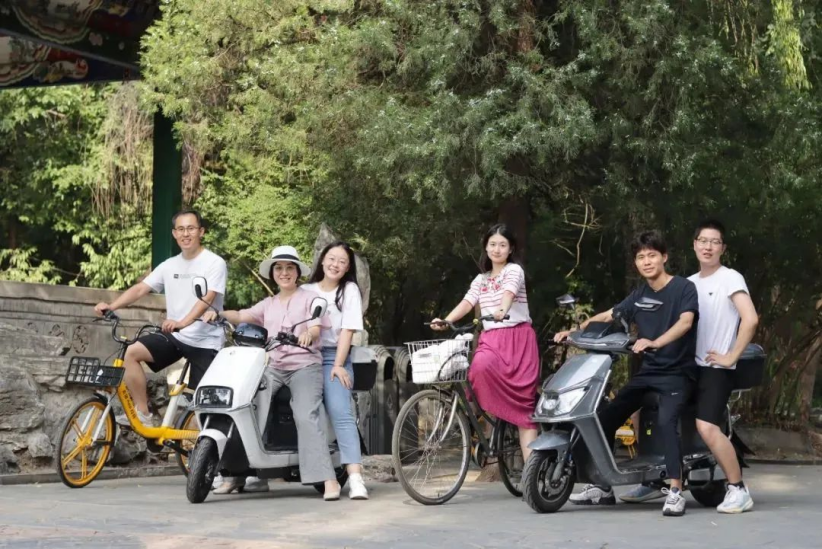
Start from here to flourish in different parts of the world